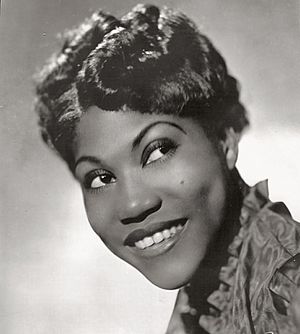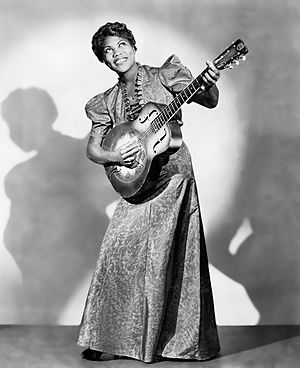Sister Rosetta Tharpe facts for kids
Quick facts for kids
Sister Rosetta Tharpe
|
|
|---|---|

Photo portrait of Tharpe, 1938, by James J. Kriegsmann
|
|
| Background information | |
| Birth name | Rosetta Nubin (or Rosether Atkins) |
| Born | March 20, 1915 Cotton Plant, Arkansas, U.S. |
| Died | October 9, 1973 (aged 58) Philadelphia, Pennsylvania, U.S. |
| Genres | |
| Instruments |
|
| Years active | 1919–1973 |
Sister Rosetta Tharpe (born Rosetta Nubin, March 20, 1915 – October 9, 1973) was an amazing American singer and guitarist. She became very popular in the 1930s and 1940s. Her music was a special mix of spiritual gospel songs and the exciting sound of the electric guitar.
She was the first big star in gospel music. She also helped bring gospel music to audiences who loved rhythm and blues and rock and roll. Because of her influence, she was called "the original soul sister" and "the Godmother of rock and roll." Many early rock-and-roll musicians, like Little Richard, Johnny Cash, Elvis Presley, and Chuck Berry, were inspired by her.
Tharpe was a true pioneer with her guitar. She was one of the first popular artists to use a strong, distorted sound on her electric guitar. This helped pave the way for electric blues. Her guitar playing also greatly influenced British blues in the 1960s. Famous guitarists like Eric Clapton and Keith Richards have talked about her impact.
Sister Rosetta Tharpe was brave enough to perform her spiritual music in nightclubs and concert halls. She often played with big bands. This helped make spiritual music more popular. Her hit songs like "Rock Me" (1938) and "This Train" (1939) were very important. Even though some churchgoers didn't like her playing in pop settings, she always stayed true to gospel music.
Her 1944 song "Down by the Riverside" was chosen by the Library of Congress for its special collection. They noted how her guitar playing and singing influenced early rhythm-and-blues artists. Her 1945 hit "Strange Things Happening Every Day" was a huge success. It was the first gospel record to become popular on the "race records" chart (which later became the R&B chart). Many people say this song was a very early example of rock and roll, or even the first rock and roll record. In 2018, Sister Rosetta Tharpe was honored by being added to the Rock and Roll Hall of Fame.
Contents
Early Life and Music Journey
Rosetta Nubin was born on March 20, 1915, in Cotton Plant, Arkansas. Her parents, Katie Bell Nubin and Willis Atkins, picked cotton. Her mother, Katie, was also a singer and played the mandolin. She was a leader in the Church of God in Christ (COGIC). This church encouraged lively music and allowed women to sing and teach.
Rosetta started singing and playing guitar when she was just six years old. She was known as "Little Rosetta Nubin" and was seen as a musical genius. Around 1921, she began performing with her mother in a traveling church group. They traveled across the American South, performing songs and sermons.
In the mid-1920s, Rosetta and her mother moved to Chicago. They performed religious concerts and traveled to church meetings. Rosetta became very famous as a young musical talent. It was rare to see black female guitarists who were so well-known at that time.
In 1934, when she was 19, she married Thomas Thorpe, a preacher. She decided to use a version of his last name for her stage name: Sister Rosetta Tharpe. Even though her marriage didn't last long, she kept the name for the rest of her life. In 1938, she moved to New York City with her mother.
Becoming a Recording Star
On October 31, 1938, at age 23, Sister Rosetta Tharpe made her first recordings for Decca Records. She recorded four songs with Lucky Millinder's jazz orchestra. These were the first gospel songs ever recorded by Decca. Songs like "Rock Me" and "That's All" became instant hits. This made her an overnight sensation and one of the first gospel artists to sell many records. "Rock Me" inspired many rock-and-roll singers, including Elvis Presley and Little Richard.
Her records caused a stir. Some churchgoers were shocked by the mix of gospel words and pop-sounding music. But audiences outside the church loved her unique style.
Tharpe performed at famous places like the Cotton Club in Harlem and Carnegie Hall. Performing gospel music in nightclubs, alongside blues and jazz musicians, was very unusual. Some religious groups didn't approve of a woman playing guitar in such places. Because of this, some parts of the gospel community were not happy with her.
During this time, being good at guitar was often linked to men. People would compliment Tharpe by saying she could "play like a man." She even showed off her skills in guitar battles at the Apollo Theater.
She continued recording during World War II. She was one of only two gospel artists who could record special "V-discs" for soldiers overseas.
Her song "Strange Things Happening Every Day" (1944) showed off her amazing guitar skills and clever lyrics. It was the first gospel song to appear on Billboard magazine's "Harlem Hit Parade" chart. Many people consider this 1944 recording to be the first rock and roll record. Tharpe toured throughout the 1940s, often with gospel groups like the Dixie Hummingbirds.
In 1946, Tharpe met Marie Knight and saw her special talent. They toured together for several years, recording hits like "Up Above My Head". Their popularity slowed down around 1949.
In 1951, Tharpe's third marriage to her manager, Russell Morrison, was a huge event. About 25,000 people paid to attend her wedding, which was followed by a concert at Griffith Stadium in Washington, D.C.. In 1952, Tharpe and Red Foley recorded "Have a Little Talk with Jesus." This was likely the first time a black and white artist recorded a duet together in the US.
In 1964, Tharpe toured Europe with other blues and gospel artists like Muddy Waters. A famous concert was filmed in the rain at a disused railway station in Manchester. This concert showed her powerful performance to a new audience.
Later Years and Lasting Impact
Sister Rosetta Tharpe's performances became limited after she had a stroke in 1970. She also had complications from diabetes, which led to one of her legs being amputated. She passed away on October 9, 1973, in Philadelphia, after another stroke. She was buried in Northwood Cemetery in Philadelphia.
Musical Influence and Legacy
Tharpe's guitar style mixed city blues with traditional folk music. Her strong, rhythmic playing was a very early form of rock and roll.
Many famous musicians have said Sister Rosetta Tharpe influenced them. Little Richard said she was his favorite singer when he was a child. She even invited him to sing with her on stage when he was young, which inspired him to become a performer. Johnny Cash also called her his favorite singer. Other artists like Aretha Franklin, Jerry Lee Lewis, and Tina Turner were influenced by her singing, guitar playing, and stage presence.
A PBS article noted that Elvis Presley was influenced by Tharpe. They said, "when you see Elvis Presley singing songs early in his career, I think you [should] imagine, he is channeling Rosetta Tharpe."
In 2018, singer Frank Turner wrote a song called "Sister Rosetta" about her influence. He sang about how she deserved to be in the Rock and Roll Hall of Fame.
Cleveland.com stated that Tharpe "plugged into an electric guitar in the late 1930s and became a rock star before the men considered the pioneers of rock and roll had dreamt of doing so. She's the 'Godmother of rock and roll' who influenced every musician traditionally identified with helping launch the genre during the 1950s."
Awards and Recognition
Interest in Sister Rosetta Tharpe's work has grown over time. She has been honored with biographies, radio segments, and awards. The United States Postal Service even issued a special stamp to honor her in 1998. In 2007, she was added to the Blues Hall of Fame.
In 2008, a concert helped raise money for a marker on her grave. January 11 was declared Sister Rosetta Tharpe Day in Pennsylvania. A gravestone was placed later that year. A special historical marker was also approved for her home in Philadelphia.
In 2011, BBC Four aired a documentary called Sister Rosetta Tharpe: The Godmother of Rock & Roll. This film was later shown in the US as part of the PBS series American Masters. The film has been shown many times, especially to mark her 100th birthday in 2015. A musical play called Marie And Rosetta, based on her relationship with Marie Knight, opened in New York in 2016.
On December 13, 2017, Sister Rosetta Tharpe was officially elected to the Rock and Roll Hall of Fame as an Early Influence. National Public Radio wrote that she "was a gospel singer at heart who became a celebrity by forging a new path musically... She was, and is, an unmatched artist."
Selected Recordings
Sister Rosetta Tharpe released many albums and singles throughout her career. Here are some of her important albums:
- Gospel Songs (1947)
- Blessed Assurance (1951)
- Gospel Train (1956)
- The Gospel Truth (1959)
- Sister on Tour (1961)
- Precious Memories (1968)
Some of her songs that appeared on music charts include:
- "Strange Things Happening Every Day" (1945) – Reached number 2 on the US R&B chart.
- "Precious Memories" (1948) – Reached number 13 on the US R&B chart.
- "Up Above My Head, I Hear Music in the Air" (1948) – Reached number 6 on the US R&B chart.
- "Silent Night (Christmas Hymn)" (1949) – Reached number 6 on the US R&B chart.
Images for kids
See also
 In Spanish: Sister Rosetta Tharpe para niños
In Spanish: Sister Rosetta Tharpe para niños
 | Emma Amos |
 | Edward Mitchell Bannister |
 | Larry D. Alexander |
 | Ernie Barnes |



